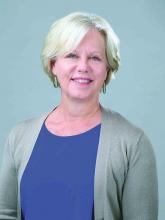LAS VEGAS – A brief sexual history should be part of the first patient visit, according to Anita H. Clayton, MD. However, addressing sexual health can prove challenging, especially if the patient is experiencing difficulty in that aspect of life.
“In America, we don’t talk about sex in a serious kind of way,” Dr. Clayton said at an annual psychopharmacology update held by the Nevada Psychiatric Association. “If people are talking about sex they’re either bragging or lying.”
Dr. Clayton, David C. Wilson Professor and chair of psychiatry and neurobehavioral sciences at the University of Virginia, Charlottesville, encourages addressing sexual functioning in the same way as she does screening for alcohol abuse, drug use, and smoking. “The first time you see somebody, it’s worth getting at least a brief sexual history so you know what their level of sexual function is and whether they’ve had a history of sexual problems,” she said. “Working it into your routine exam makes good sense, and you want to track these [problems] across the lifetime of care.”
Sexual functioning assessment tools to consider using include the Changes in Sexual Functioning Questionnaire, the Sexual Interest and Desire Inventory for females, and the Decreased Sexual Desire Screener. In premenopausal women, hypoactive sexual desire disorder is a common primary sexual dysfunction. Hypoactive sexual desire disorder is equally common in postmenopausal women, Dr. Clayton said, with the addition of complaints related to vaginal atrophy or genitourinary symptoms of menopause. In men, erectile dysfunction ranks as the most common primary sexual dysfunction. It can occur at any time but tends to increase in frequency at midlife.
Dr. Clayton recommends opening the dialogue with a brief questionnaire or an open-ended question, while maintaining cultural sensitivity, including references to sexual orientation and age. “It can be helpful to define terms,” she added. “I find that people often say, ‘I don’t get aroused anymore,’ but it could possibly mean that they’re not interested in sex anymore. You have to delineate what they’re talking about. Find out if they’re doing the kind of things that previously led them to having a satisfying sexual life. If they’re dissatisfied now, what is the issue? Desire? Arousal?” Taking a ubiquity-style approach to questions also can prove helpful: “Many people with depression experience sexual dysfunction. Do you have any complaints?” Or, “As people get older, sometimes they experience problems in their sexual function or changes in their level of desire. Have you had any such changes?”
The discussion itself might be therapeutic for the patient. “You may find out that what they’re experiencing. It’s not an unusual phenomenon,” said Dr. Clayton, who is a member of the board of directors of the International Society for the Study of Women’s Sexual Health. “For example, if women at midlife are having difficulty with arousal, they might try lubricants. Or, in talking with a younger woman who may not have yet experienced an orgasm, you can tell her it’s not that uncommon and talk about how that can be helped.”
If a sexual problem persists, ask about the nature and duration of the problem and/or changes. Ask about possible stressors and try to rule out any relationship issues or situational problems. “Is the problem generalized or does it occur in all situations? If it’s situational, you probably should work on that first,” said Dr. Clayton, who also has a secondary appointment at the university as professor of clinical obstetrics and gynecology.
Diagnosis of a primary sexual dysfunction is based on clinical presentation, not on testosterone levels or other laboratory values.
Dr. Clayton disclosed having received research grants from several entities, including Forest Research Institute, Janssen, and Takeda Pharmaceuticals. She also has received advisory board fees and/or consulting fees from several companies, including Fabre-Kramer, Takeda, S1 Biopharma, and Sprout Pharmaceuticals, a division of Valeant Pharmaceuticals. Dr. Clayton also has ownership interest in Euthymics Bioscience and S1 Biopharma.


